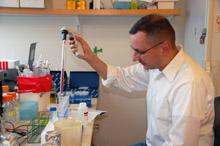
The Mullins laboratory is located in Building F on the South Lake Union campus of the University of Washington School of Medicine. Our lab uses molecular, computational, and virus biology techniques to provide insights into the relationship between HIV and its human hosts in an effort to fight the AIDS pandemic. We use a variety of methods to document and understand the implications of HIV's extraordinary genetic diversity on the immunopathogenesis of AIDS, with a particular emphasis on acute/early infection and superinfection. We then apply this information to develop more effective vaccines and therapies in collaboration with other investigators. Our research work focuses on the acquisition and computational characterization of HIV nucleotide sequences, the development of web tools for related computational studies, in vitro studies of the growth properties of viral isolates, host genetic polymorphism analysis, and high-throughput analysis of cellular transcription.
